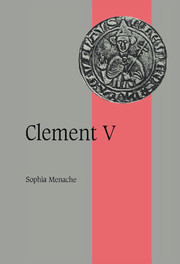5 - France
Published online by Cambridge University Press: 04 December 2009
Summary
Historians have often considered Clement V subservient to Philip the Fair. In this regard, Edgard Boutaric reflects a common view when he claims that ‘the pontificate of Clement V was … a continuous chain of concessions to the endless exigencies of the king’. Heinrich Finke echoes this premise when he argues that no pope of the later middle ages was more subservient to a king, a conclusion shared by Joseph R. Strayer. Such evaluations reflect the views of fourteenth-century chroniclers and their criticism of the alliance between pope and king, which they considered detrimental to the Church. A close analysis of contemporary documentation, however, offers a more complex picture: the pope may have given vociferous support to the king, but he implemented an independent policy based on his own scale of priorities. In the most crucial events of Philip's reign, such as the crisis in Flanders and the trials of Pope Boniface and the Templars, Clement succeeded in sabotaging the original plans of Philip the Fair, while, if not advancing, at least protecting papal aims. By trying to find a middle course between his own and the king's interests, Clement prevented an open conflict with Philip the Fair that might have put an end to the dearest goal of his pontificate: the crusade.
Clement's belief in the Gesta Dei per Francos turned the achievement of a durable peace between France and England into a primary objective of curial diplomacy. Further, it justified papal assistance to Philip the Fair on all fronts. Clement enlisted Church resources on behalf of the Capetian treasury and fostered the nomination of royal proteges to leading ecclesiastical positions.
- Type
- Chapter
- Information
- Clement V , pp. 174 - 246Publisher: Cambridge University PressPrint publication year: 1998

